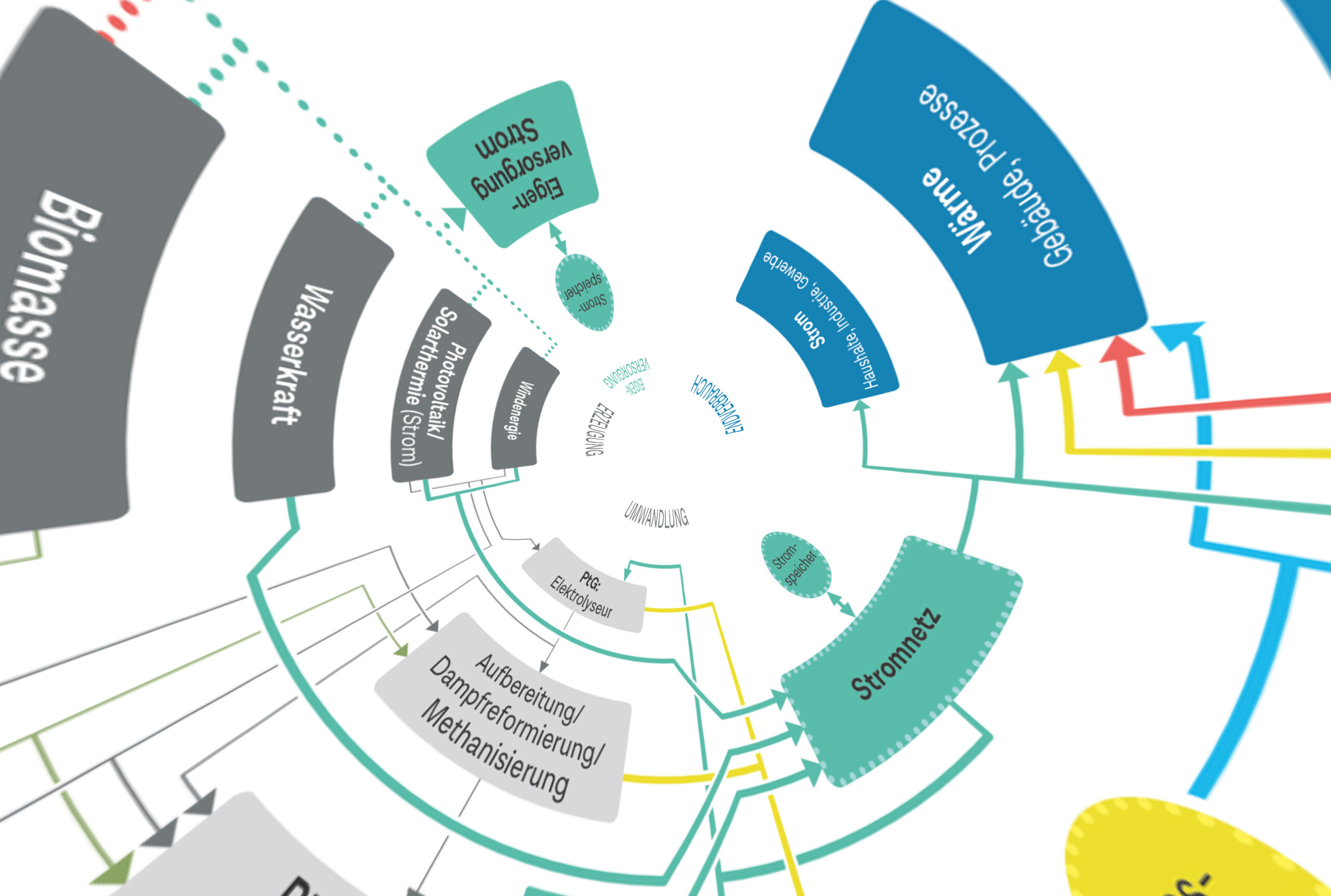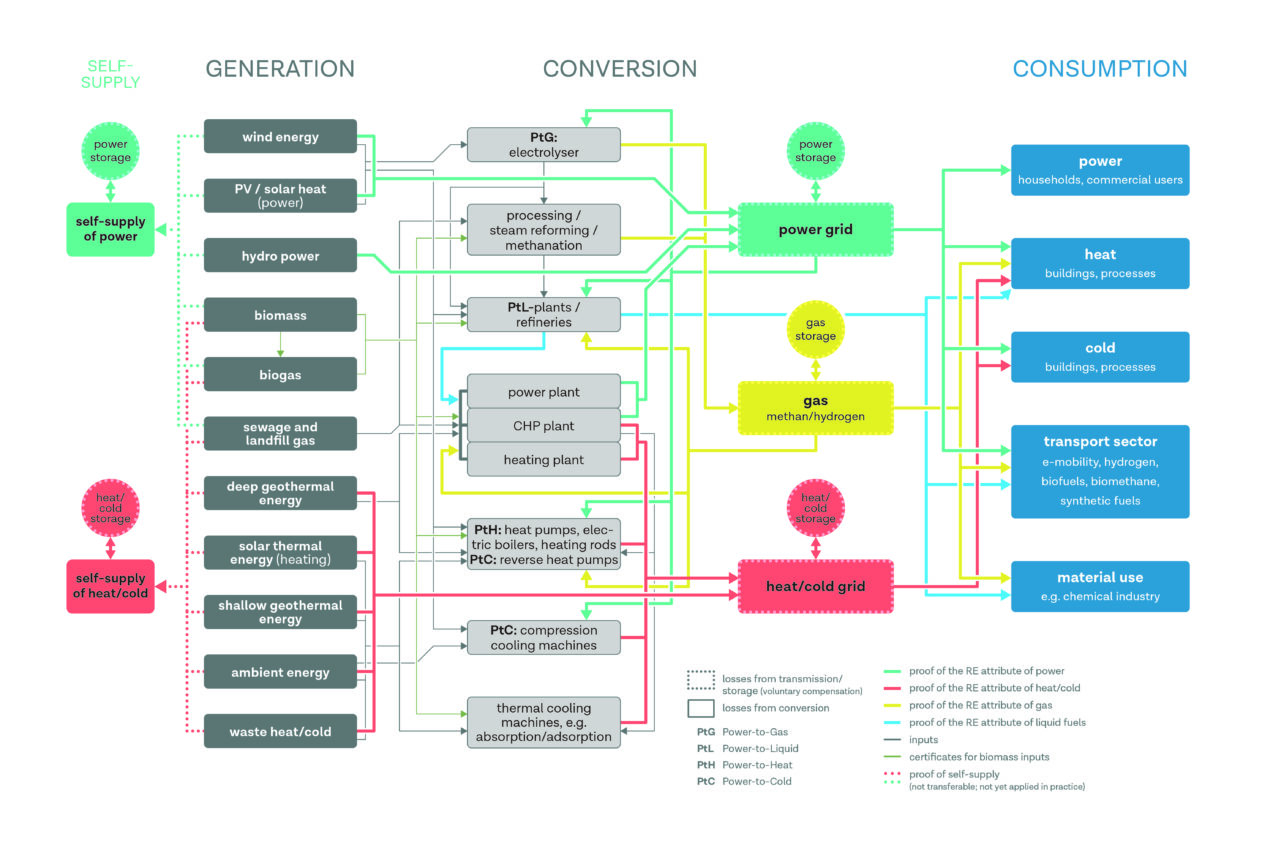
Guarantees of Origin for renewable energies
What was previously established almost exclusively in the electricity sector is now being extended to other sectors: Guarantees of Origin (GOs) are also intended to document and make traceable the green attributes of energy forms such as heating and cooling or gases from renewable sources. This brings opportunities and challenges. Hamburg Institut is doing pioneering work in this area.
MAKING THE GREEN ORIGIN OF ENERGY COMPREHENSIBLE
The impetus comes from the European Union: The 2018 the amendment of the Renewable Energy Directive, known as RED II, made the introduction of Guarantees of Origin systems mandatory also for gases (e.g. biomethane, synthetic gases, hydrogen) as well as heating and cooling from renewable energy sources. This also has implications for Germany: for these forms of energy GO systems must be set up – in addition to the existing GO system for electricity and mass balancing and sustainability certification for biomass, biofuels and biomethane.
The complexity of a future sector-spanning verification system poses new challenges for market and regulatory actors. On the other hand, there are far-reaching opportunities in the form of new differentiation and marketing possibilities for suppliers, new sources of income for renewable energy producers and additional verification options for energy consumption in industry, mobility and the building sector. GOs can therefore play an important role as an instrument in the operational implementation of the energy transition.
We help shape market developments
Hamburg Institut has built up extensive and well-founded expertise in this field. We are conducting research in projects with national and European pilot character, whose results are likely to help shape further developments in this field. In addition, we are active in the DIN working group for the revision of the GO standard EN 16325 and co-chair the Project Team Heating & Cooling at CEN/CENELEC JTC 14 Working Group 5 “Guarantees of Origin related to energy”. We also advise energy suppliers and associations on Guarantees of Origin and green electricity.
A Selection of PROJECTS WE ARE CURRENTLY WORKING ON
Establishment of a pilot Guarantees of Origin registry for green district heating

IW3 – “Integrierte WärmeWende Wilhelmsburg” is one of the Energy Transition Laboratories of the Federal Ministry for Economic Affairs and Energy (BMWi). The goal: a carbon-neutral heating supply for the city district Hamburg-Wilhelmsburg. In the sub-project “Green District Heating”, Hamburg Institut has set up the first registry for heating and cooling Guarantees of Origin in Germany.
By allocating green attributes of heat from renewable energy sources to buildings and quarters, heating GOs enable suppliers to market green district heating as a distinct product in a legally secure manner. Revenues from this can facilitate the refinancing of new projects for the generation of carbon-neutral heating.
Guarantees of Origin in industry

Funded by the German Federal Ministry for the Environment, we are supporting the further development of Guarantees of Origin systems for renewable energies in the “GO4Industry” project. Many industrial companies need to shift to an inceasingly green production. This requires energy sources that are verifiably and guaranteed renewable. This in turn requires the corresponding trustworthy evidence, policy guidelines as well as practical advice on implementation. It is precisely at this interface that the “GO4Industry” project comes into play. It is developing the basis for a comprehensive national verification concept for renewable energies. This includes an analysis of how Guarantees of Origin and other verification concepts for renewable energy sources could interact in the future.
More information: GO4Industry project website
Among others, the following Hamburg Institut reports have been published in the project part “Fundamentals”:
G2: Purpose and instrumental scope of guarantees of origin
G4: Sectoral, legal and transnational interfaces in renewable energy verification systems
Disclosure for regional electricity – analysis and recommendations
On behalf of the Federal Environment Agency as operator of the Regional Guarantees of Origin Registry, Hamburg Institut is investigating the transparency and consumer-friendliness of disclosure rules for regional green electricity. A clear presentation should support the goal of regional green electricity disclosure to strengthen the acceptance of the energy transition locally.
For this, it is necessary that consumers perceive and understand the information on the origin of electricity supply disclosed to them. To this end, we are developing recommendations for forms of presentation.
More information
at a glance
Overview of possible future verification pathways for renewable energies

FAQ
What is sector coupling?
Sector coupling is the increasing integration of the energy sectors electricity, heating/cooling and transport into an overarching approach to energy supply. The view as an overall system enables and promotes aspects such as an increase in energy efficiency, the digital control of demand and supply, and the storage of energy. The integration of fluctuating renewable energies instead of fossil fuels is of central importance. In this way, sector coupling is a key factor in the energy transition – for the decarbonisation of energy production and consumption.
What is RED II?
RED II stands for the Renewable Energy Directive II and refers to the Directive (EU) 2018/2001 of the European Parliament and of the Council of 11 December 2018 on the promotion of the use of energy from renewable sources. It provides for a binding overall target at EU level of 32 % renewable energy by 2030. The member states must “jointly ensure” that the EU-wide expansion target is achieved from 2021 onwards.
In the course of the amendment of the directive, the EU has, among other things, expanded the area of application for Guarantees of Origin: in addition to electricity, the directive now also requires the introduction of Guarantees of Origin systems for renewable gases (including hydrogen) as well as for heating and cooling.
What are Guarantees of Origin?
As the name suggests, Guarantees of Origin – or GOs for short – serve to provide transparency about the origin of energy. So far, this kind of verification system has only been established in the green electricity markets. The applications of GOs can be very diverse, including the original ideas of providing consumers with clear documentation of the origin of their electricity and enabling the tradability of renewable energy characteristics. As an instrument, GOs can also be used to support the implementation and monitoring of renewably energy policy instruments.
In the case of electricity, a fundamental distinction must be made between physical electricity transmission, electricity trading and the transfer of green electricity characteristics. Physically, every customer receives electricity from the nearest power plant (“path of least resistance”). Electricity trade is handled via balancing groups, where supply and demand needs to be balanced at all times. However, more and more consumers are making a conscious decision to purchase green electricity. This is where origin tracking comes into play: the origin of the electricity from renewable energies is proven by means of GOs. Suppliers can procure GOs from the same renewable energy producers as energy deliveries or seperately.
A Guarantee of Origin can be issued for each megawatt hour of green electricity produced. It records information such as energy source and technology, plant location and age, and whether a plant or the energy produced has received public support. GOs can be traded within a country and between many European states. In Europe, energy supply companies must back up each MWh sold as green electricity by a corresponding quantity of cancelled GOs in the Guarantee of Origin registry of the respective country. This ensures that the green quality of green electricity is only sold once to a customer. A special regulation applies to Germany: plants that are subsidised under the Renewable Energy Sources Act cannot be issued Guarantees of Origin. In this way, the legislator wants to express that the green quality of EEG electricity that is shown separately in the electricity labelling would not be sold or supplied again (so-called ban on double marketing).
In addition to the electricity sector, the development of GO systems for heating/cooling and gases is currently ongoing. Several projects and initiatives at European and national level are currently dedicated to this task.
Contact
Did we spark your interest?
Meet Hamburg Institut in person
Conferences, lectures, workshops, trade fairs - the team of Hamburg Institut is looking forward to meeting you in person and exchanging ideas with you. We will inform you here as soon as new dates are fixed.
